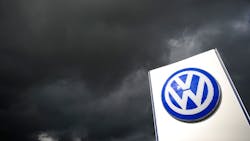VW Seeks to Quell Investor Uprising Over Emissions Damages
Volkswagen AG Chief Executive Officer Matthias Mueller offered little more than an apology as the German carmaker sought to appease disgruntled investors for the damages caused by the diesel-emissions scandal.
While Volkswagen vowed to shore up internal processes to prevent a repeat of the cheating, it offered little new insight into the origins of the crisis. The company also stopped short of committing to cut management pay, with Chairman Hans Dieter Poetsch promising merely to “review” remuneration policies.
“What’s done cannot be undone,” Mueller said Wednesday in a speech prepared for the first shareholder meeting since the scandal erupted in September. “What does lie in our power is ensuring we act in a responsible manner. This is our commitment to you.”
Institutional investors are taking a rare public stand at the gathering in Hanover, Germany, to grill management over their handling of the crisis. Poetsch, who served as chief financial officer when the cheating occurred, is hosting the meeting amid criticism about his direct move from executive to chief overseer. While investors were willing to look past the carmaker’s insular structure when the company was doing well, Volkswagen’s no longer getting a free pass with its shares down more than 20% since it admitted to rigging diesel vehicles to cheat on emissions tests.
“The corporate governance problem at VW starts with the supervisory board,” said Hans-Christoph Hirt, co-chief executive officer of shareholder advisory group Hermes Equity Ownership Services Ltd., citing a lack of independent members well-versed in the auto industry. “This is an exceptional situation, and we believe a special audit by external, independent investigators is needed to clarify what went wrong.”
Many professional investors are planning to opt against ratifying the actions of the management and supervisory boards. Rejecting the normally non-controversial agenda item would be tantamount to a no-confidence vote. Investors are also calling into question Volkswagen’s ability to carry out an honest investigation into the origins of the cheating.
German shareholder meetings can drag on for hours as investors are given the right to demand answers from management. Still, the protest at Volkswagen will be largely ceremonial. Most investors hold non-voting preferred shares, while the voting stock is mainly in friendlier hands.
‘Justifiable Concerns’
The Porsche and Piech families, descendants of the creator of the VW Beetle, own 52% of the common shares. The German state of Lower Saxony holds 20% and has special rights, along with workers, that are enshrined in Volkswagen’s bylaws. That gives outsiders limited opportunity to influence the company, even in the wake of scandal.
“There are justifiable concerns about the company’s ability to investigate these matters internally and present their findings to shareholders in an impartial and transparent manner,” Institutional Shareholder Services said in a report, assigning Volkswagen the advisory firm’s lowest score for corporate governance.
Joerg Hofmann, head of labor union IG Metall and deputy chairman of the supervisory board, defended Poetsch, saying at the meeting that he is the only person who has the support of workers and enjoys the trust of Volkswagen’s major shareholders. Porsche SE, the holding company for the family’s stake, is sticking to its recommendation to exonerate Volkswagen’s management and supervisory boards.
Whereas Poetsch and Mueller would have liked to have had a more positive message to present, a settlement in the U.S. has been delayed until next week, and new allegations have emerged in Germany. On Monday, Braunschweig prosecutors opened a probe into whether former CEO Martin Winterkorn was too slow to tell investors about the potential cost of rigging diesel cars to pass emissions tests. Herbert Diess, head of the VW brand, is also being investigated.
Volkswagen said the investigation doesn’t involve new facts or revelations and had previously argued that the company informed investors properly based on the information available at the time. VW recommends that shareholders vote in favor of exonerating management, part of German stock market rules. Volkswagen’s supervisory board was split over the recommendation, Frankfurter Allgemeine Zeitung reported, citing unnamed company sources. The results of the shareholder vote will show the level of support, though legal implications are limited.
‘Colossal Damage’
That’s not stopping investors from pursuing complaints. The California State Teachers’ Retirement System claimed on Tuesday that VW misled investors about emissions, seeking damages that could reach as high as 700 million euros if other investors agree to join the action. Another 278 institutional investors sued in March to seek 3.3 billion euros in a lawsuit over the timing of market disclosures. Volkswagen has so far set aside 16.2 billion euros for the scandal, including repairs, legal costs and fines.
“VW is multiplying the damage that has been done already by reacting only to the things where it sees the most urgency,” Henning Wegener, a board member of Stichting Volkswagen Investors Claim, a foundation established last year to urge a settlement for a group of investors whose holdings total 13 billion euros, said at a press conference on Monday in Frankfurt. “The damage to date is colossal.”
About the Author
Bloomberg
Licensed content from Bloomberg, copyright 2016.
